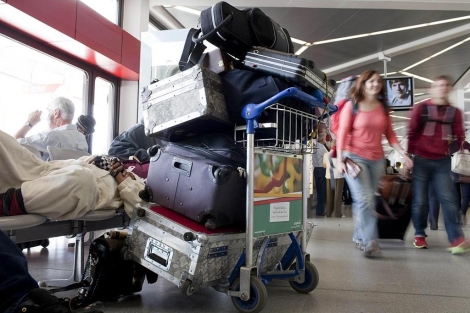The personal data of millions of passengers flying between the U.S. and Europe, including phone numbers, addresses and credit card may be stored up to 15 years by the Department of Homeland Security U.S., according to a draft agreement between Washington and Brussels. The draft, seen by the newspaper 'The Guardian' opens a channel for the data provided to airlines in the check-in can be analyzed by the U.S.
in the name of fighting terrorism, crime and illegal immigration. The U.S. administration wants to require airlines to passenger ratio of 96 hours before departure in order to collate the data on their lists of terroristmo and immigration. The agreement recognizes that there are times that passengers will experience delays or may not fly mistakenly identified as a threat, which gives them the right to seek judicial review in U.S.
federal court. The text also details the procedures to follow in case of loss of data provided in advance or unauthorized disclosure, while including provisions under which certain "sensitive personal data", ethnic origin, political opinions, and details related to the health or sex life can be used in exceptional circumstances in which a person's life may be endangered.
It is likely that the period of storage of information causes controversy, because it is three times more than covered by the EU as a protocol PNR (passenger name record or passenger name record), which covers flights to, from and within Europe. A five and a half years has been negotiated in a similar agreement with Australia.
This week Germany and France have expressed concern about the agreement and the necessity of the measure. Britain has already announced its intention to select the protocol NRP, the Secretary of State, Ministry of Interior and Minister of Equality, Theresa May, has played a role. In turn, it is expected that Britain will adhere to the agreement with the U.S.
this summer. Damian Green, the interior minister, has stressed in relation to the effectiveness of the PNR: "By using an automated system and be able to question intelligently, we can quickly filter data to reveal patterns and links that are not otherwise easily. " The draft agreement makes no explicit mention of tracking profiles, but speaks of "processing and analysis of PNR data." The U.S.
Senate last week passed a resolution stating that "simply could not accept" any decline in the exchange of data by the European ministers, describing it as "an important part of our defense against terrorism" . The senators stressed that "the identification of potential threats before entry into our country" was an important tool of security agencies.
The European Parliament, which would have to approve the text, however, has demanded proof that the PNR agreement is necessary, while also specified that in no case be used for data mining or profiling. A provisional agreement for the exchange of passenger data between the EU and the U.S.
remains in force since 2007 but has been the subject of intense debate across the continent with regard to civil liberties. In this regard, the draft appears to address the U.S. claims. A leak from the legal advisors of the EU Council also shows that the PNR system is disproportionate and inconsistent with the requirements of confidentiality in the context of human rights.
The German constitutional court has ruled that six months is the maximum period of retention of personal data for the telecommunications sector. The US-EU agreement is to end with some concerns about privacy, and proposes "mask" or "depersonalize" the identity of travelers at the Department of Homeland Security within six months.
The data will be transferred to a standby database after five years, which would keep 10 others. The text, however, allowing officials to 'recover' the identity of a subject at any time and in relation to a legal transaction. Moreover, the agreement covers not only transatlantic flights.
Also appears to raise the possibility that airlines have to provide details of the PNR to Washington for other international flights, allowing passengers data are distributed to other agencies in countries outside the EU and the U.S.. Philip Jan Albrecht, the German Green Party and member of the committee of the European Parliament civil liberties of freedom, said that the agreement in its current form should be rejected.
"The agreement provided with the U.S. PNR violates fundamental constitutional principles of European states. The Europeans should have the right to protection of their fundamental rights when it comes to cooperation with other countries like USA and Australia." "Retain personal information for five or more years is a gross violation of the principles of data protection.
The massive collection and analysis of PNR data under the new agreements can not be justified in view of recent court decisions," he added . According to Albrecht, "the non-transparent practices in the U.S. profiles are clearly at odds with the demands of the European Parliament. In this way, Parliament has to reject the proposal." The data collected included 19 different headings related to each passenger, including billing information, contact number, the names of those traveling with luggage and the amount of packages they carry, and their itinerary.
Airlines are required to supply these details with up to 96 hours in advance, compared to 72 hours which includes the existing interim agreement. 


in the name of fighting terrorism, crime and illegal immigration. The U.S. administration wants to require airlines to passenger ratio of 96 hours before departure in order to collate the data on their lists of terroristmo and immigration. The agreement recognizes that there are times that passengers will experience delays or may not fly mistakenly identified as a threat, which gives them the right to seek judicial review in U.S.
federal court. The text also details the procedures to follow in case of loss of data provided in advance or unauthorized disclosure, while including provisions under which certain "sensitive personal data", ethnic origin, political opinions, and details related to the health or sex life can be used in exceptional circumstances in which a person's life may be endangered.
It is likely that the period of storage of information causes controversy, because it is three times more than covered by the EU as a protocol PNR (passenger name record or passenger name record), which covers flights to, from and within Europe. A five and a half years has been negotiated in a similar agreement with Australia.
This week Germany and France have expressed concern about the agreement and the necessity of the measure. Britain has already announced its intention to select the protocol NRP, the Secretary of State, Ministry of Interior and Minister of Equality, Theresa May, has played a role. In turn, it is expected that Britain will adhere to the agreement with the U.S.
this summer. Damian Green, the interior minister, has stressed in relation to the effectiveness of the PNR: "By using an automated system and be able to question intelligently, we can quickly filter data to reveal patterns and links that are not otherwise easily. " The draft agreement makes no explicit mention of tracking profiles, but speaks of "processing and analysis of PNR data." The U.S.
Senate last week passed a resolution stating that "simply could not accept" any decline in the exchange of data by the European ministers, describing it as "an important part of our defense against terrorism" . The senators stressed that "the identification of potential threats before entry into our country" was an important tool of security agencies.
The European Parliament, which would have to approve the text, however, has demanded proof that the PNR agreement is necessary, while also specified that in no case be used for data mining or profiling. A provisional agreement for the exchange of passenger data between the EU and the U.S.
remains in force since 2007 but has been the subject of intense debate across the continent with regard to civil liberties. In this regard, the draft appears to address the U.S. claims. A leak from the legal advisors of the EU Council also shows that the PNR system is disproportionate and inconsistent with the requirements of confidentiality in the context of human rights.
The German constitutional court has ruled that six months is the maximum period of retention of personal data for the telecommunications sector. The US-EU agreement is to end with some concerns about privacy, and proposes "mask" or "depersonalize" the identity of travelers at the Department of Homeland Security within six months.
The data will be transferred to a standby database after five years, which would keep 10 others. The text, however, allowing officials to 'recover' the identity of a subject at any time and in relation to a legal transaction. Moreover, the agreement covers not only transatlantic flights.
Also appears to raise the possibility that airlines have to provide details of the PNR to Washington for other international flights, allowing passengers data are distributed to other agencies in countries outside the EU and the U.S.. Philip Jan Albrecht, the German Green Party and member of the committee of the European Parliament civil liberties of freedom, said that the agreement in its current form should be rejected.
"The agreement provided with the U.S. PNR violates fundamental constitutional principles of European states. The Europeans should have the right to protection of their fundamental rights when it comes to cooperation with other countries like USA and Australia." "Retain personal information for five or more years is a gross violation of the principles of data protection.
The massive collection and analysis of PNR data under the new agreements can not be justified in view of recent court decisions," he added . According to Albrecht, "the non-transparent practices in the U.S. profiles are clearly at odds with the demands of the European Parliament. In this way, Parliament has to reject the proposal." The data collected included 19 different headings related to each passenger, including billing information, contact number, the names of those traveling with luggage and the amount of packages they carry, and their itinerary.
Airlines are required to supply these details with up to 96 hours in advance, compared to 72 hours which includes the existing interim agreement.



- Kevin Durant: Durant and Thunder Have Bigger Problems Than Just Game 5 (26/05/2011)
- Kevin Durant: Will Durant Solve Dallas Mavericks Defense in Game 5? (26/05/2011)
- Spanish Revolution - An LGBT Activist in Spain Speaks (23/05/2011)
- NBA Playoffs 2011: Does Kevin Durant Lack the Assertiveness Needed to Win? (25/05/2011)
- Si Dios Quiere (21/05/2011)
No comments:
Post a Comment